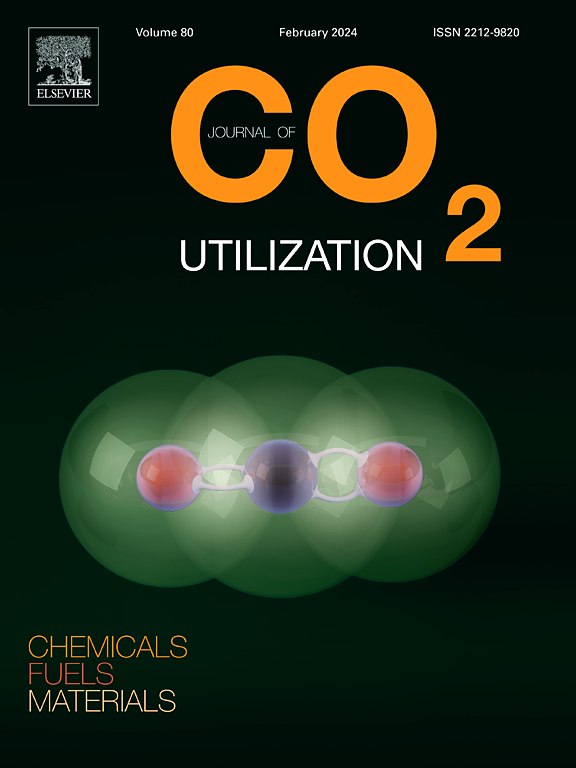Optimizing bimetallic and multimetallic Cu-based catalysts by promoters for enhanced reverse Water-Gas Shift reaction: Insights and stability assessments
IF 7.2
2区 工程技术
Q1 CHEMISTRY, MULTIDISCIPLINARY
引用次数: 0
Abstract
This study investigates bimetallic and multimetallic catalysts tailored for the reverse water gas shift (RWGS) reaction. Promoting with potassium and iron, while maintaining a constant copper content of 15 wt% on γ-alumina, revealed that bimetallic catalysts containing 7.5 wt% iron and 5 wt% potassium exhibit superior catalytic activity and stability. Among the multimetallic catalysts, the optimal composition was found to be in the 15 wt% Cu-5 wt% Fe-2.5 wt% K/γ-Al2O3 catalyst for the RWGS reaction. The prepared catalysts underwent assessments using various techniques such as N2 adsorption-desorption, XRD, H2-TPR, CO2-TPD, and FESEM. Stability assessments conducted over 72 hours showcased sustained long-term performance for the optimized catalysts, highlighting the influential role of the hierarchical structure. Mesopores extended the catalyst lifetime by reducing permeation limits, while macropores facilitated diffusion process, enhancing selectivity and stability. This hierarchical design also improved mass transfer, amplifying reaction rates. The synthesized catalysts exhibited exceptional specificity, demonstrating 100 % selectivity for the RWGS reaction. Particularly, under H2/CO2=1, these catalysts displayed remarkable carbon dioxide conversion rates, indicating potential for enhancing Cu-based catalysts in RWGS reactions by maximizing active sites.
通过促进剂优化双金属和多金属铜基催化剂,以增强水-气反向变换反应:见解和稳定性评估
本研究探讨了为水煤气反向变换(RWGS)反应定制的双金属和多金属催化剂。在保持γ-氧化铝上 15 wt%的铜含量不变的情况下,通过使用钾和铁进行催化,发现含 7.5 wt%铁和 5 wt%钾的双金属催化剂具有更高的催化活性和稳定性。在多金属催化剂中,15 wt% Cu-5 wt% Fe-2.5 wt% K/γ-Al2O3 催化剂是 RWGS 反应的最佳组成。所制备的催化剂经过了各种技术的评估,如 N2 吸附-解吸、XRD、H2-TPR、CO2-TPD 和 FESEM。在 72 小时内进行的稳定性评估表明,优化后的催化剂具有持续的长期性能,突出了分层结构的影响作用。介孔通过降低渗透极限延长了催化剂的使用寿命,而大孔则促进了扩散过程,提高了选择性和稳定性。这种分层设计还改善了传质,提高了反应速率。合成的催化剂具有优异的专一性,对 RWGS 反应的选择性达到 100%。特别是在 H2/CO2=1 的条件下,这些催化剂显示出显著的二氧化碳转化率,这表明通过最大限度地增加活性位点,铜基催化剂在 RWGS 反应中具有增强潜力。
本文章由计算机程序翻译,如有差异,请以英文原文为准。
求助全文
约1分钟内获得全文
求助全文
来源期刊

Journal of CO2 Utilization
CHEMISTRY, MULTIDISCIPLINARY-ENGINEERING, CHEMICAL
CiteScore
13.90
自引率
10.40%
发文量
406
审稿时长
2.8 months
期刊介绍:
The Journal of CO2 Utilization offers a single, multi-disciplinary, scholarly platform for the exchange of novel research in the field of CO2 re-use for scientists and engineers in chemicals, fuels and materials.
The emphasis is on the dissemination of leading-edge research from basic science to the development of new processes, technologies and applications.
The Journal of CO2 Utilization publishes original peer-reviewed research papers, reviews, and short communications, including experimental and theoretical work, and analytical models and simulations.
 求助内容:
求助内容: 应助结果提醒方式:
应助结果提醒方式:


